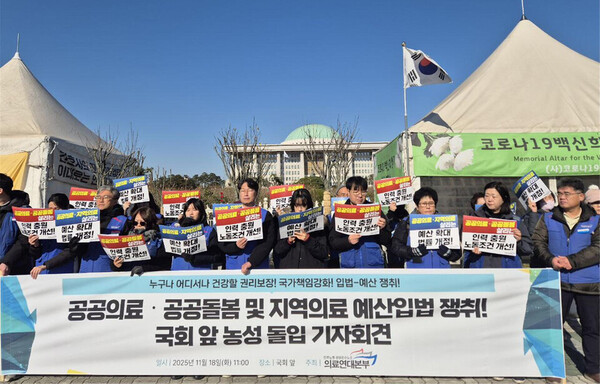The Medical Solidarity Headquarters began a sit-in protest in front of the National Assembly on Tuesday, demanding the establishment of a public medical school and operational funding support for national university hospitals.
The Medical Solidarity Headquarters held a press conference in front of the National Assembly on Tuesday, announcing six key demands and stating it would conduct a daily sit-in protest from 8 a.m. to 6 p.m.

The six demands are: increasing budgets and revising laws to strengthen public healthcare; enhancing the role and funding of national university hospitals; expanding medical staff through public medical schools and a regional doctor system; legislating patient-to-nurse ratios; improving care workers’ conditions; and building a healthcare system with worker and citizen participation.
The Medical Solidarity Headquarters criticized the government’s inaction, stating: “Despite national university hospitals facing deficits exceeding 560 billion won ($382 million) last year due to medical policy conflict, the government has failed to deliver any direct countermeasures, including operational funding support. The support budget for these hospitals and local medical centers, crucial to public and regional healthcare, remains stagnant.”
The Medical Solidarity Headquarters also pointed out that the “Special Act on Strengthening Essential Medical Care and Reducing Regional Medical Disparities,” which passed the National Assembly Health and Welfare Committee on Sept. 23, lacks a clear definition of essential medical care and concrete plans to strengthen public healthcare. Furthermore, it noted that there is no guarantee that the special account will result in investment in public hospitals.
It further stated, “Similarly stagnant are legislative revisions needed to introduce public medical schools and a regional doctor system to expand the insufficient medical workforce in local and public healthcare, as well as discussions on the essential patient-to-nurse ratio legislation required to improve medical quality.”
Park Kyung-deuk, head of the Medical Solidarity Headquarters, said, “The (2026) Ministry of Health and Welfare budget contained no plan to resolve the nearly 600 billion won deficit of national university hospitals and lacked funds to expand public care. We will pour all our organizational strength into the fight for legal amendments, legislation, and the budget.”
Kwon Soon-nam, head of the Chungbuk National University Hospital branch of the Medical Solidarity Headquarters’ North Chungcheong Province chapter, argued that oversight of national university hospitals should be returned from the Ministry of Education to the Ministry of Health and Welfare. “We will fight to demand the transfer of national university hospitals to the Ministry of Health and Welfare and support for their operating costs,” he declared.
The Medical Solidarity Headquarters plans to hold a resolution rally with the Movement Headquarters for Making Good Public Hospitals on Thursday and a cultural event in front of the National Assembly on Friday next week. A petition campaign to amend the Nursing Act to legislate patient-to-nurse ratios will continue until the end of this month and will be submitted to the National Assembly and the government. As of Tuesday, 4,132 people had signed.

